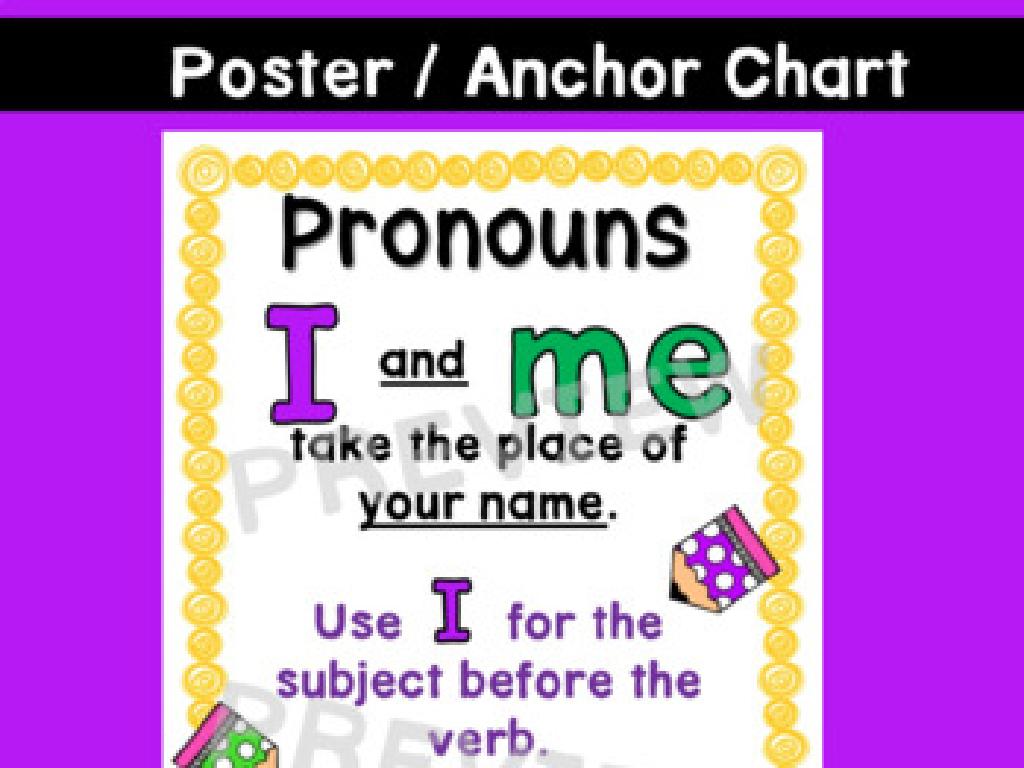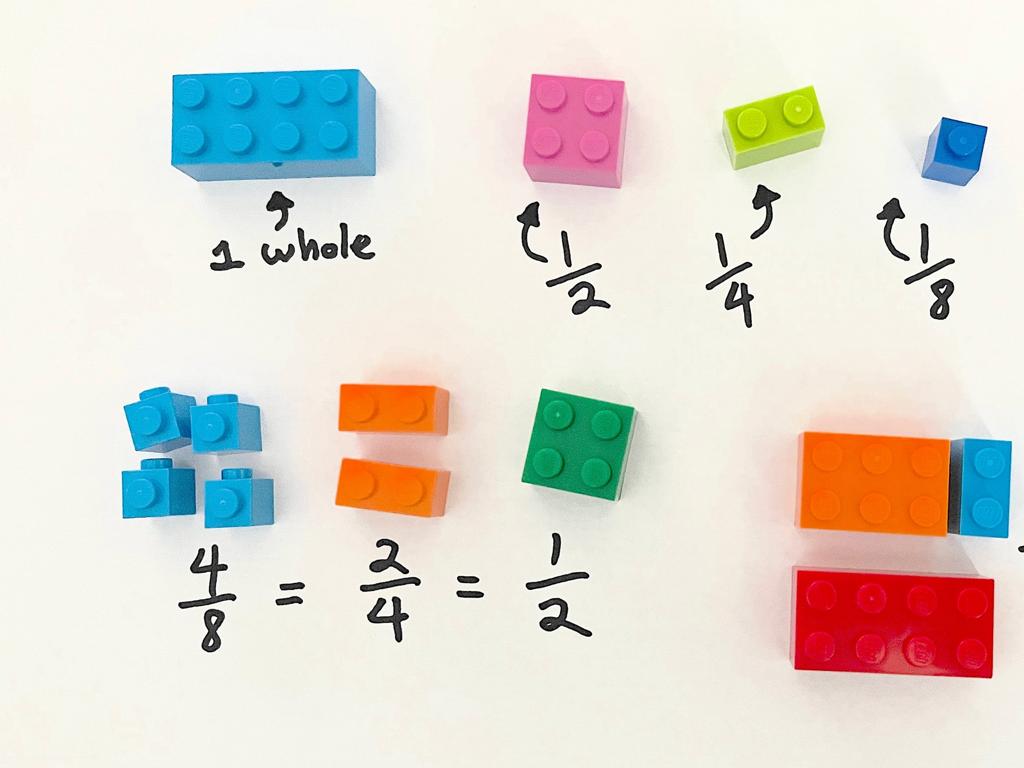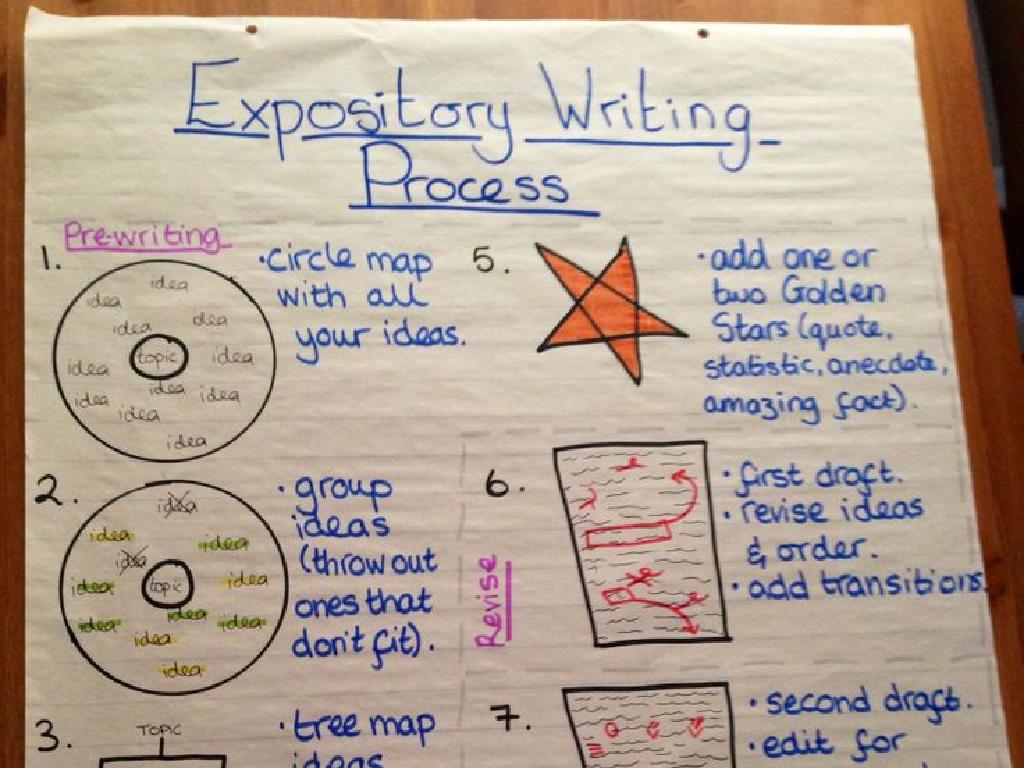Use Greek And Latin Roots As Clues To The Meanings Of Words
Subject: Language arts
Grade: Seventh grade
Topic: Greek And Latin Roots
Please LOG IN to download the presentation. Access is available to registered users only.
View More Content
Unlocking Vocabulary with Greek and Latin Roots
– Discover language building blocks
– Roots: Foundation of many words
– For example, ‘bio’ means life in Greek, as in ‘biology’ or ‘biography’.
– Roots aid in vocabulary mastery
– Recognizing roots helps decipher unfamiliar words.
– Significance of roots in learning
|
This slide introduces the concept of Greek and Latin roots, which are the fundamental elements that form a large portion of the English language. By understanding these roots, students can begin to decode the meaning of complex vocabulary without always consulting a dictionary. Emphasize that a single root can give rise to multiple words, enhancing their word comprehension and retention. Encourage students to think of roots as clues that can unlock the meaning of new words they encounter in their reading. Provide examples of common roots and ask students to identify any words they know that contain those roots. This foundational knowledge will be pivotal in expanding their vocabulary and improving their language arts skills.
Unlocking Word Meanings with Roots
– Define a root word
– The main part of a word without prefix/suffix
– Roots vs. prefixes and suffixes
– Prefix: beginning part, Suffix: ending part of words
– Examples of common roots
– ‘bio’ means life, ‘geo’ means earth
– Understanding root meanings
– Recognize how roots give clues to word meanings
|
This slide introduces the concept of root words, which are the fundamental parts of words that carry meaning. Understanding roots, especially from Greek and Latin, can help students decipher the meanings of complex vocabulary. It’s crucial to explain the difference between root words, prefixes, and suffixes, as this will aid in their comprehension and vocabulary skills. Provide examples of common roots such as ‘bio’ (life) and ‘geo’ (earth) to illustrate how they form the basis of many English words. Encourage students to look for these roots in words they encounter to better understand unfamiliar terms. This foundational knowledge will be a valuable tool for their language arts studies.
Unlocking Word Meanings with Greek Roots
– ‘bio’ means life
– Examples: biology (study of life), biosphere (life-supporting layer of earth)
– ‘geo’ means earth
– Examples: geology (study of earth), geode (earth-shaped rock)
– ‘phon’ means sound
– Examples: microphone (device to amplify sound), symphony (sounds together)
– Combine roots to form words
– ‘biography’ (life story), ‘geography’ (earth description), ‘phonetic’ (sound related)
|
This slide introduces students to the concept of Greek roots in English vocabulary, which can help them decipher the meanings of complex words. Start by explaining each root and providing examples. Then, show how these roots are the building blocks of many English words, combining with other word parts to create terms with related meanings. For the activity, provide a list of vocabulary words and ask students to identify the Greek roots and their meanings. This will help students understand how a root can give a clue to the meaning of a word. Encourage students to think of additional words that include these roots. The activity will reinforce their understanding and ability to decode unfamiliar words using Greek roots.
Unlocking Word Meanings with Latin Roots
– ‘aqua’ means water
– Examples: ‘aquarium’ (a water container), ‘aqueduct’ (a water channel)
– ‘scribe’ means write
– Examples: ‘describe’ (to write about), ‘inscription’ (a written message)
– ‘vision’ means see
– Examples: ‘television’ (device for seeing), ‘visionary’ (a seer)
– Roots form new words
– Combine roots with other parts to create words with related meanings
|
This slide introduces students to the concept of Latin roots and how they form the basis of many English words. Understanding these roots can help students decipher the meanings of unfamiliar words. Start by explaining each root and providing examples of words that contain these roots. For the activity, create a matching exercise where students pair Latin roots with their meanings and examples of words that contain these roots. This will reinforce their understanding and help them recognize patterns in word formation. Encourage students to look for these roots in other words they encounter in their reading.
Using Roots to Understand Words
– Strategies for decoding word meanings
– Use roots as hints to define unfamiliar words
– Practice with ‘autobiography’, ‘geothermal’, ‘microphone’
– ‘auto’ means self, ‘bio’ means life, ‘graph’ means write
– Group activity: dissect words
– Split words into their basic elements
– Understanding prefixes and suffixes
– Prefixes come before the root, suffixes after
|
This slide introduces students to the concept of using Greek and Latin roots to decipher the meanings of complex words. Start by discussing strategies such as looking for familiar roots or breaking down words into smaller parts. Use ‘autobiography’, ‘geothermal’, and ‘microphone’ as examples to practice these strategies. For group work, have students work together to identify the roots, prefixes, and suffixes in each word and discuss how these elements contribute to the word’s meaning. Emphasize the importance of understanding prefixes and suffixes as they modify the root’s meaning and can be a powerful tool in expanding vocabulary. The activity will help reinforce the lesson and encourage collaborative learning.
Practice: Greek and Latin Roots
– Complete the worksheet individually or in pairs
– Identify roots in unfamiliar words
– Look for the Greek or Latin parts of the word
– Predict meanings based on roots
– Use the root to guess what the whole word means
– Share and discuss findings with the class
|
This slide is designed for a classroom activity to reinforce the lesson on Greek and Latin roots. Provide students with a worksheet that lists new vocabulary words. Students should work individually or with a partner to identify the Greek or Latin root in each word and use that to predict the word’s meaning. After completing the worksheet, students will share their predictions with the class and discuss the actual meanings of the words. This activity encourages critical thinking and collaborative learning. For the teacher: Prepare a diverse list of words ensuring a mix of familiar and challenging roots. Encourage students to explain their thought process during the discussion. This will help them understand how a strong grasp of roots can be a powerful tool in expanding their vocabulary.
Class Activity: Root Word Tree
– Create your Root Word Tree
– Write a root on the trunk
– Choose a Greek or Latin root for the trunk of your tree
– Branch out with derived words
– Add branches showing words that come from your root
– Present and explain your tree
– Share the meaning of each word and how it relates to the root
|
This activity is designed to help students visually understand the concept of root words and how many words can grow from a single root. Provide poster paper and markers. Students should choose a root word, write it on the trunk, and then draw branches out to words that derive from that root. Encourage creativity in the tree design. Possible roots include ‘bio’ meaning life, ‘geo’ meaning earth, ‘tele’ meaning far, and ‘photo’ meaning light. For example, from ‘bio’ students might branch out to ‘biology’, ‘biography’, ‘biodegradable’, etc. After creating their trees, each student will present to the class, explaining the root and the meaning of each derived word. This will reinforce their understanding of Greek and Latin roots and how they form the basis of many words in the English language.
Wrapping Up: Greek and Latin Roots
– Recap of today’s key points
– Homework: Discover 5 words
– Find words with Greek or Latin roots in any reading material
– Break down roots and meanings
– Write the root, its meaning, and how it contributes to the word’s definition
– Get ready for the next quiz
– Review today’s material to prepare for a quiz on Greek and Latin roots
|
As we conclude today’s lesson, remind students of the importance of understanding Greek and Latin roots in deciphering the meanings of complex words. For homework, they should find five new words with Greek or Latin roots, write them down, and explain the meanings. Encourage them to use a dictionary or online resources to assist them. This exercise will help reinforce their understanding and prepare them for the upcoming quiz. Make sure to review the roots covered in class and provide examples to ensure they are well-equipped for the quiz. Consider offering some potential root words as a starting point for their homework.






